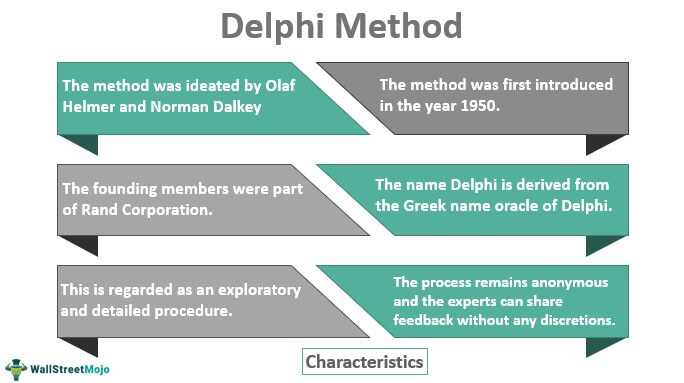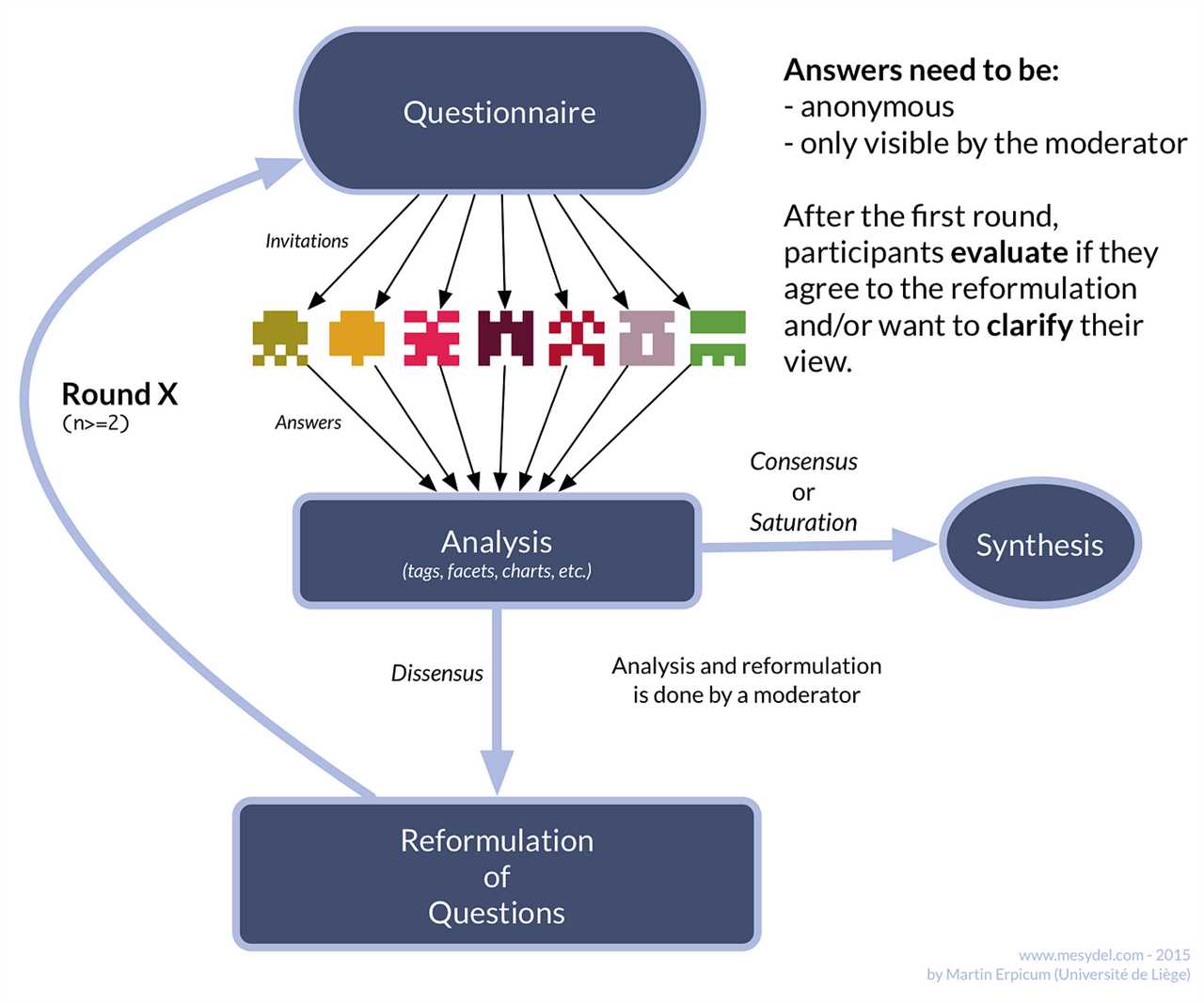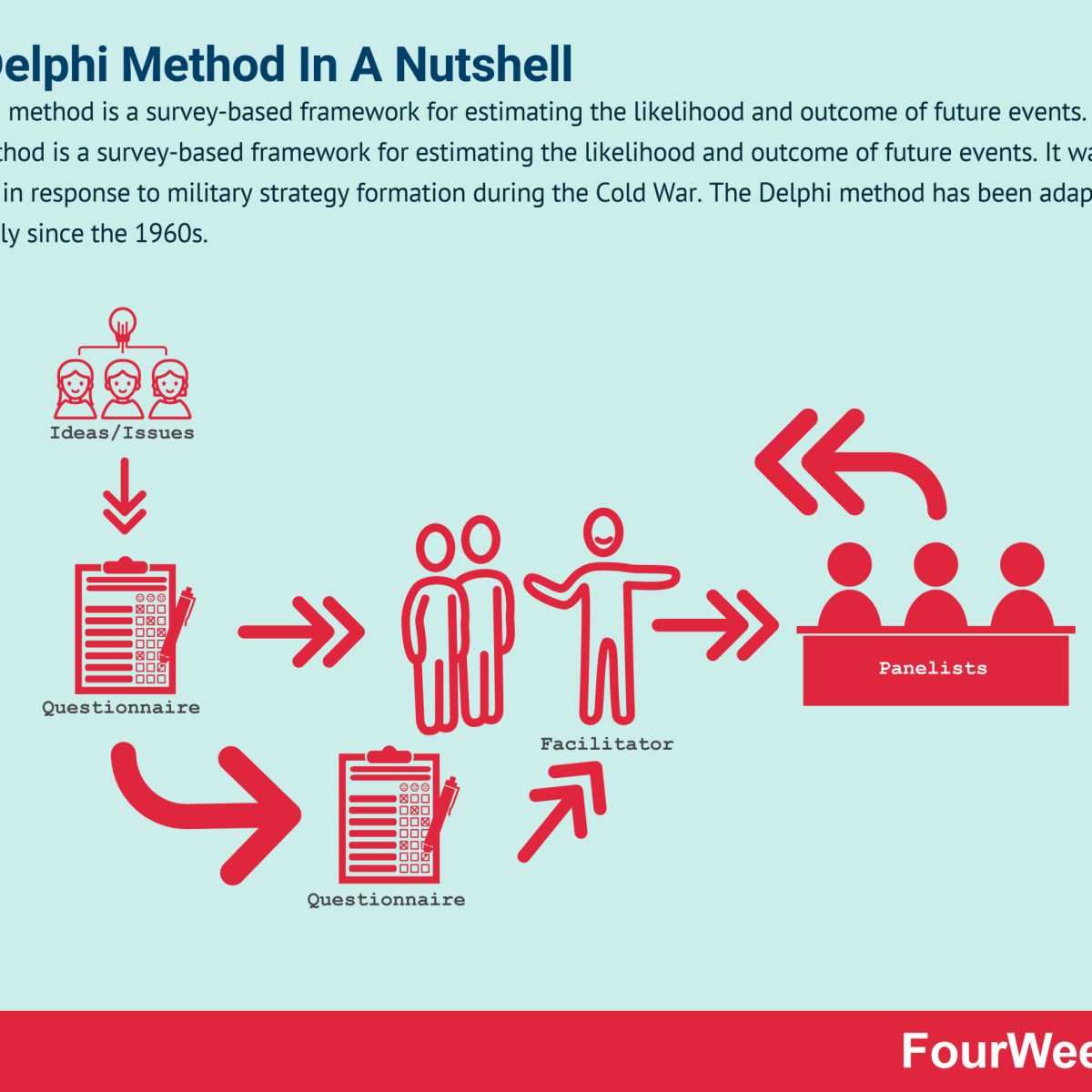Delphi Method Forecasting: Definition
The Delphi Method is a forecasting technique that is used to gather expert opinions and make predictions about future events. It is a structured and iterative process that involves multiple rounds of surveys or questionnaires, where experts are asked to provide their opinions and estimates on a specific topic.
The Delphi Method is based on the principle that a group of experts, when combined, can provide more accurate predictions than any individual expert alone. It aims to eliminate biases and groupthink by allowing experts to provide their opinions anonymously and independently.
During the Delphi Method process, experts are typically provided with feedback from previous rounds, which allows them to revise their opinions and estimates. This iterative process continues until a consensus or convergence is reached among the experts.
The Delphi Method can be used in various fields, such as business, economics, technology, and healthcare, to make predictions about market trends, future demand, technological advancements, and other relevant factors.
Overall, the Delphi Method is a valuable tool for forecasting and decision-making, as it combines the expertise of multiple individuals to provide more accurate and reliable predictions about future events.
What is Delphi Method Forecasting?
The Delphi Method is a forecasting technique that involves gathering opinions and insights from a group of experts to make predictions about future events or trends. It is a structured and iterative process that aims to achieve consensus among the experts while preserving their anonymity.
The Delphi Method was developed in the 1950s by the RAND Corporation as a way to forecast the impact of technology on warfare. Since then, it has been widely used in various fields, including business, economics, healthcare, and government.
The process typically begins with the selection of a panel of experts who have knowledge and expertise in the area being forecasted. These experts are usually chosen based on their qualifications, experience, and diversity of perspectives. The experts are then provided with a series of questionnaires or surveys, which they complete independently.
During the first round of the Delphi Method, the experts are asked to provide their individual forecasts or opinions on the topic at hand. These responses are collected and analyzed by the facilitator, who then prepares a summary report for the experts to review.
In the subsequent rounds, the experts are provided with the summary report along with any relevant feedback or comments from the other experts. They are then asked to revise their initial forecasts based on the new information. This process continues for several rounds until a consensus is reached among the experts.
The Delphi Method is designed to minimize the influence of dominant personalities or biases within the group of experts. By preserving the anonymity of the participants, it encourages open and honest communication, allowing for a more objective and unbiased forecasting process.
Once a consensus is reached, the final forecast is presented to the stakeholders or decision-makers who can use it to inform their strategic planning, policy-making, or investment decisions. The Delphi Method provides a structured and systematic approach to forecasting that leverages the collective wisdom and expertise of a diverse group of experts.
Delphi Method Forecasting: Usage
The Delphi Method is a widely used forecasting technique that relies on the input and expertise of a group of experts to make predictions about future events or trends. It is commonly used in various industries, including business, finance, technology, and healthcare, to inform decision-making and strategic planning.
1. Problem Identification
The first step in using the Delphi Method is to clearly define the problem or question that needs to be addressed. This could be anything from predicting market trends to forecasting the impact of a new technology on an industry.
2. Selection of Experts

Next, a panel of experts is selected to participate in the Delphi Method process. These experts should have relevant knowledge and experience in the field being studied. The number of experts can vary depending on the complexity of the problem, but it is generally recommended to have a diverse group to ensure a range of perspectives.
3. Round of Questionnaires

The Delphi Method involves multiple rounds of questionnaires to gather input from the experts. In the first round, the experts are asked to provide their individual predictions or opinions on the problem at hand. These responses are typically anonymous to encourage honest and unbiased input.
4. Feedback and Discussion
After the first round of questionnaires, the responses are compiled and analyzed. The experts are then provided with a summary of the group’s responses, including any areas of agreement or disagreement. This feedback allows the experts to reconsider their initial predictions and engage in a discussion with their peers.
5. Iterative Process

The Delphi Method is an iterative process, meaning that multiple rounds of questionnaires and feedback are conducted. The experts are given the opportunity to revise their predictions based on the group’s feedback and engage in further discussion. This iterative process continues until a consensus or convergence of opinions is reached.
By using the Delphi Method, organizations can tap into the collective wisdom and expertise of a group of experts to make more informed and accurate forecasts. This can help them anticipate future trends, identify potential risks and opportunities, and make better strategic decisions.
How is Delphi Method Forecasting Used in [TOOLS catname]?
![How is Delphi Method Forecasting Used in [TOOLS catname]?](/wp-content/uploads/2023/10/delphi-method-forecasting-definition-and-usage_4.jpg)
The Delphi Method is a widely used forecasting technique in the field of [TOOLS catname]. It is a systematic and iterative process that involves obtaining and aggregating expert opinions to make predictions about future events or trends.
The process of using the Delphi Method in [TOOLS catname] typically involves the following steps:
- Defining the problem: The first step is to clearly define the problem or topic for which forecasting is required. This could be anything from predicting market trends to estimating customer demand for a new product or service.
- Selecting experts: A panel of experts is selected based on their knowledge, experience, and expertise in the relevant field. These experts may be internal or external to the organization.
- Collecting initial opinions: The experts are asked to provide their individual opinions or forecasts on the problem at hand. This can be done through surveys, questionnaires, or interviews.
- Analyzing and summarizing opinions: The collected opinions are analyzed and summarized to identify areas of agreement and disagreement among the experts. This helps in identifying key trends and patterns.
- Iterative rounds of feedback: The experts are provided with a summary of the aggregated opinions and are asked to revise their initial forecasts based on this feedback. This process is repeated for multiple rounds until a consensus is reached.
- Finalizing the forecast: Once a consensus is reached, the final forecast is prepared and documented. This forecast serves as a basis for decision-making and strategic planning in [TOOLS catname].
The Delphi Method in [TOOLS catname] offers several advantages. It allows for the integration of diverse perspectives and expertise, reduces the influence of individual biases, and provides a structured approach to forecasting. It also helps in identifying potential risks and opportunities, thereby enabling proactive decision-making.

Emily Bibb simplifies finance through bestselling books and articles, bridging complex concepts for everyday understanding. Engaging audiences via social media, she shares insights for financial success. Active in seminars and philanthropy, Bibb aims to create a more financially informed society, driven by her passion for empowering others.
